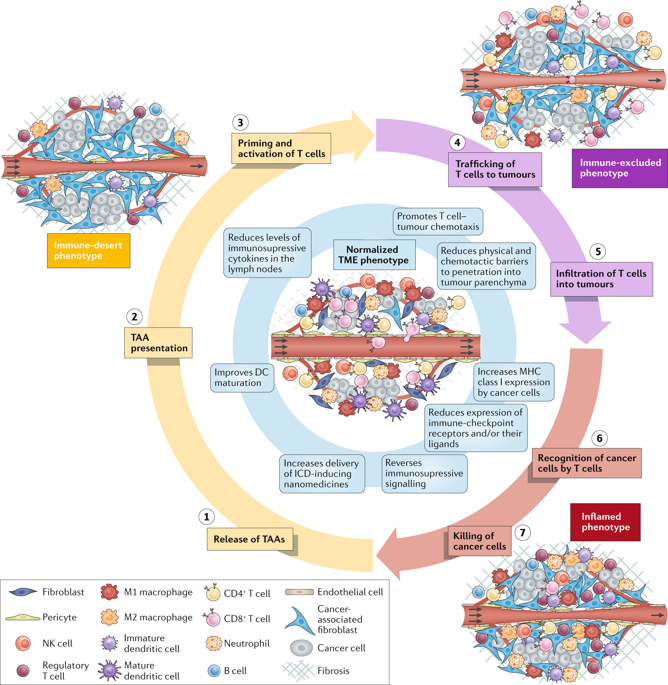当前位置:
X-MOL 学术
›
Nat. Rev. Clin. Oncol.
›
论文详情
Our official English website, www.x-mol.net, welcomes your feedback! (Note: you will need to create a separate account there.)
Improving cancer immunotherapy using nanomedicines: progress, opportunities and challenges.
Nature Reviews Clinical Oncology ( IF 78.8 ) Pub Date : 2020-02-07 , DOI: 10.1038/s41571-019-0308-z John D Martin 1 , Horacio Cabral 1 , Triantafyllos Stylianopoulos 2 , Rakesh K Jain 3
Nature Reviews Clinical Oncology ( IF 78.8 ) Pub Date : 2020-02-07 , DOI: 10.1038/s41571-019-0308-z John D Martin 1 , Horacio Cabral 1 , Triantafyllos Stylianopoulos 2 , Rakesh K Jain 3
Affiliation

|
Multiple nanotherapeutics have been approved for patients with cancer, but their effects on survival have been modest and, in some examples, less than those of other approved therapies. At the same time, the clinical successes achieved with immunotherapy have revolutionized the treatment of multiple advanced-stage malignancies. However, the majority of patients do not benefit from the currently available immunotherapies and many develop immune-related adverse events. By contrast, nanomedicines can reduce - but do not eliminate - the risk of certain life-threatening toxicities. Thus, the combination of these therapeutic classes is of intense research interest. The tumour microenvironment (TME) is a major cause of the failure of both nanomedicines and immunotherapies that not only limits delivery, but also can compromise efficacy, even when agents accumulate in the TME. Coincidentally, the same TME features that impair nanomedicine delivery can also cause immunosuppression. In this Perspective, we describe TME normalization strategies that have the potential to simultaneously promote the delivery of nanomedicines and reduce immunosuppression in the TME. Then, we discuss the potential of a combined nanomedicine-based TME normalization and immunotherapeutic strategy designed to overcome each step of the cancer-immunity cycle and propose a broadly applicable 'minimal combination' of therapies designed to increase the number of patients with cancer who are able to benefit from immunotherapy.
中文翻译:

使用纳米药物改善癌症免疫疗法:进展,机遇和挑战。
多种纳米疗法已被批准用于癌症患者,但是它们对生存的影响是适度的,在某些实例中,其效果低于其他已批准的疗法。同时,免疫疗法取得的临床成功彻底改变了多种晚期恶性肿瘤的治疗方法。然而,大多数患者不能从当前可用的免疫疗法中受益,并且许多患者发生免疫相关的不良事件。相比之下,纳米药物可以减少但不能消除某些威胁生命的毒性风险。因此,这些治疗类别的组合具有强烈的研究兴趣。肿瘤微环境(TME)是纳米药物和免疫疗法失败的主要原因,不仅限制了药物的递送,而且还可能损害疗效,即使代理商在TME中积累。巧合的是,损害纳米药物输送的相同TME功能也会引起免疫抑制。在此观点中,我们描述了TME标准化策略,该策略具有同时促进纳米药物输送和减少TME中免疫抑制的潜力。然后,我们讨论了基于纳米医学的TME标准化和免疫治疗相结合的策略的潜力,该策略旨在克服癌症-免疫周期的每个步骤,并提出了一种广泛适用的“最小组合”治疗方法,旨在增加罹患癌症的癌症患者的数量。能够从免疫疗法中受益。我们描述了TME标准化策略,该策略有可能同时促进纳米药物的交付并减少TME中的免疫抑制。然后,我们讨论了基于纳米医学的TME标准化和免疫治疗相结合的策略的潜力,该策略旨在克服癌症-免疫周期的每个步骤,并提出了一种广泛适用的“最小组合”治疗方法,旨在增加罹患癌症的癌症患者的数量。能够从免疫疗法中受益。我们描述了TME标准化策略,该策略有可能同时促进纳米药物的交付并减少TME中的免疫抑制。然后,我们讨论了基于纳米医学的TME标准化和免疫治疗相结合的策略的潜力,该策略旨在克服癌症-免疫周期的每个步骤,并提出了一种广泛适用的“最小组合”治疗方法,旨在增加罹患癌症的癌症患者的数量。能够从免疫疗法中受益。
更新日期:2020-02-07
中文翻译:

使用纳米药物改善癌症免疫疗法:进展,机遇和挑战。
多种纳米疗法已被批准用于癌症患者,但是它们对生存的影响是适度的,在某些实例中,其效果低于其他已批准的疗法。同时,免疫疗法取得的临床成功彻底改变了多种晚期恶性肿瘤的治疗方法。然而,大多数患者不能从当前可用的免疫疗法中受益,并且许多患者发生免疫相关的不良事件。相比之下,纳米药物可以减少但不能消除某些威胁生命的毒性风险。因此,这些治疗类别的组合具有强烈的研究兴趣。肿瘤微环境(TME)是纳米药物和免疫疗法失败的主要原因,不仅限制了药物的递送,而且还可能损害疗效,即使代理商在TME中积累。巧合的是,损害纳米药物输送的相同TME功能也会引起免疫抑制。在此观点中,我们描述了TME标准化策略,该策略具有同时促进纳米药物输送和减少TME中免疫抑制的潜力。然后,我们讨论了基于纳米医学的TME标准化和免疫治疗相结合的策略的潜力,该策略旨在克服癌症-免疫周期的每个步骤,并提出了一种广泛适用的“最小组合”治疗方法,旨在增加罹患癌症的癌症患者的数量。能够从免疫疗法中受益。我们描述了TME标准化策略,该策略有可能同时促进纳米药物的交付并减少TME中的免疫抑制。然后,我们讨论了基于纳米医学的TME标准化和免疫治疗相结合的策略的潜力,该策略旨在克服癌症-免疫周期的每个步骤,并提出了一种广泛适用的“最小组合”治疗方法,旨在增加罹患癌症的癌症患者的数量。能够从免疫疗法中受益。我们描述了TME标准化策略,该策略有可能同时促进纳米药物的交付并减少TME中的免疫抑制。然后,我们讨论了基于纳米医学的TME标准化和免疫治疗相结合的策略的潜力,该策略旨在克服癌症-免疫周期的每个步骤,并提出了一种广泛适用的“最小组合”治疗方法,旨在增加罹患癌症的癌症患者的数量。能够从免疫疗法中受益。


























 京公网安备 11010802027423号
京公网安备 11010802027423号